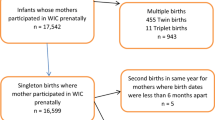Abstract
Background Though in-person contacts in the home have demonstrated efficacy in improving breastfeeding outcomes in peer counseling programs, home contacts are resource-intensive. Objective To compare the feasibility and effectiveness of an Integrated Model of peer counseling breastfeeding support characterized by select home visits augmented with individual WIC clinic visits and group education, in contrast to the Standard Model which includes a standard number of in-person home contacts. Methods Six counties (n = 226 participants) and nine counties (n = 472 participants) were assigned to the Standard Model and the Integrated Model, respectively. Differences in demographic characteristics and breastfeeding outcomes were tested using Chi square tests and Cox proportional hazards regression models. Results Participants in counties where the Integrated Model was implemented had fewer home contacts (p = 0.03) and were more likely to have a hospital (p = 0.03) or group education (p < 0.001) contact, whereas Standard Model participants were more likely to receive an individual WIC clinic contact (p < 0.001). While there was no difference in the hazard of discontinuing any breastfeeding between groups, participants in the Integrated Model group had a lower hazard of discontinuing exclusive breastfeeding by 3 months postpartum (p = 0.02). Among participants within the Integrated Model, group education classes were associated with higher hazard of discontinuation (p = 0.04 and p = 0.003 for any and exclusive breastfeeding, respectively). Conclusions It was feasible for peer counselors to implement changes in program delivery to achieve fewer home visits without a detrimental impact on breastfeeding outcomes. However, group education classes did not appear to be beneficial for improving breastfeeding outcomes in this population.

Similar content being viewed by others
References
Centers for Disease Control and Prevention National Immunization Survey. (2015). Rates of any and exclusive breastfeeding rates by sociodemographics among children born in 2011. Retrieved from http://www.cdc.gov/breastfeeding/data/nis_data/rates-any-exclusive-bf-socio-dem-2011.htm.
Chapman, J. D., Morel, K., Anderson, A. K., Damio, G., & Perez-Escamilla, R. (2010). Breastfeeding peer counseling: from efficacy through scale up. Journal of Human Lactation, 26, 314–326.
Desmond, C., Bland, R. M., Boyce, G., Coovadia, H. M., Coutsoudis, A., Rollins, N., et al. (2008). Scaling-up exclusive breastfeeding support programmes: The example of KwaZulu-Natal. PLoS One, 3(6), e2454.
Greiner, T. (2014). Exclusive breastfeeding: measurement and indicators. International Breastfeeding Journal, 9, 18.
Haroon, S., Das, J. K., Salam, R. A., Imdad, A., & Bhutta, Z. A. (2013). Breastfeeding promotion interventions and breastfeeding practices: a systematic review. BMC Public Health, 13(Suppl 3), S20.
Johnston, M., Landers, S., Noble, L., Szucs, K., & Viehmann, L. (2012). Breastfeeding and the use of human milk. Pediatrics, 129(3), e827–e841.
Jolly, K., Ingram, L., Khan, K. S., Deeks, J. J., Freemantle, N., & MacArthur, C. (2012). Systematic review of peer support for breastfeeding continuation: meta-regression analysis of the effect of setting, intensity, and timing. BMJ,. doi:10.1136/bmj.d8287.
Michigan Public Health Institute. (2016). WIC breastfeeding basics. Retrieved from https://events.mphi.org/wic/wic-breastfeeding-basics/.
Olson, B. H., Haider, S. J., Vangjel, L., Bolton, T. A., & Gold, J. G. (2008). A quasi-experimental evaluation of a breastfeeding support program for low income women in Michigan. Maternal and Child Health Journal, 14(1), 86–93.
Renfrew, M. J., McCormick, F. M., Wade, A., Quinn, B., & Dowswell, T. (2012). Support for healthy breastfeeding mothers with healthy term babies. The Cochrane Database of Systematic Reviews,. doi:10.1002/14651858.
Rossman, B. (2007). Breastfeeding peer counselors in the united states: Helping to build a culture and tradition of breastfeeding. Journal of Midwifery and Women’s Health, 52(6), 631–637.
Rozga, M. R., Kerver, J. M., & Olson, B. H. (2015a). Impact of peer counselling breast-feeding support programme protocols on any and exclusive breast-feeding discontinuation in low-income women. Public Health Nutrition, 18(3), 453–463.
Rozga, M. R., Kerver, J. M., & Olson, B. H. (2015b). Self-reported reasons for breastfeeding cessation among low-income women enrolled in a peer counseling breastfeeding support program. Journal of Human Lactation, 31(1), 129–137.
Wong, K. L., Tarrant, M., & Lok, K. Y. (2015). Group versus individual professional antenatal breastfeeding education for extending breastfeeding duration and exclusivity: A systematic review. Journal of Human Lactation, 31(3), 354–366.
World Health Organization. (2015). The World Health Organization’s infant feeding recommendation. Retrieved from http://www.who.int/nutrition/topics/infantfeeding_recommendation/en/.
Acknowledgments
This project was funded by the Kellogg Foundation grant P3020823 and the Special Supplemental WIC Program administered by MDHHS. Thank you to the BFI PCs who work tirelessly and passionately to support breastfeeding women and to the participants who enrolled in this program.
Author information
Authors and Affiliations
Corresponding author
Ethics declarations
Conflict of interest statement
The authors have no conflict of interest.
Rights and permissions
About this article
Cite this article
Rozga, M.R., Benton, P.A., Kerver, J.M. et al. An Integrated Model of Breastfeeding Peer Counseling Support is Feasible and Associated with Improved Exclusive Breastfeeding. Matern Child Health J 20, 2589–2598 (2016). https://doi.org/10.1007/s10995-016-2086-x
Published:
Issue Date:
DOI: https://doi.org/10.1007/s10995-016-2086-x



